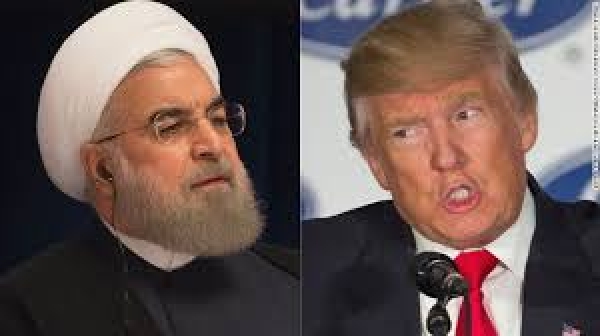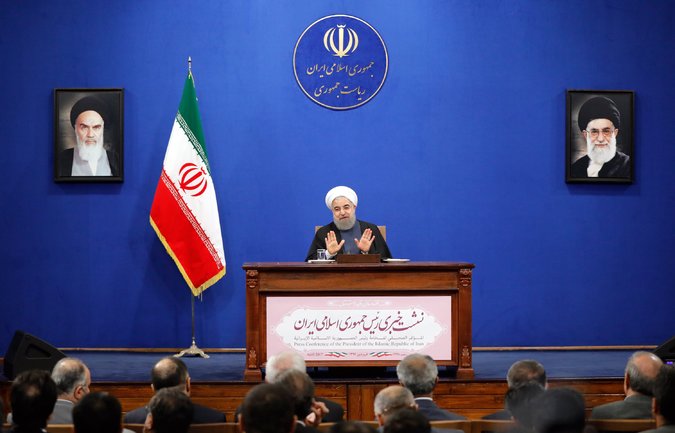
US doesn’t recognize nuclear deal could be base, rather than ceiling, for relations w Iran, creating possibility of US LOSING a Middle Eastern enemy. When was the last time that happened ??? Unfortunately, Trump’s handling of North Korea situation makes it dubious he can overcome three groups who want to undercut or destroy nuclear deal: right-wing Congressmen, who want to void the accord by amending it; right-wing Iranians, who complain about national humiliation & lack of concrete economic benefits so far; finally, Saudi & other Sunni political Islamists who want to enroll the US in their Muslim civil war with Iran and Shi’ism – a role Trump seems only too happy to accept. Trump needs to realize nuclear deal has improved US situation in the region. Top: Rouhani and Trump – perfect together ??? Below, Rex “Empty Suit” Tillerson speaking in Washington last week..
“President Trump has flip-flopped many times during his first months in office.
But none may be as consequential as his decision on April 18 to certify that Iran is abiding by the nuclear deal of 2015, paving the way for further waiving of sanctions.
In just a few months, Trump has gone from promising to “tear up” the nuclear deal to allowing its extension.
The administration has now said it will conduct a 90-day review of whether lifting sanctions —
as required by the nuclear deal — will be in line with American national security interests.
But that timeline is NOT long enough to save the deal and stop the United States and Iran from sliding dangerously back to a path toward war.
There are a number of potential land mines on the near horizon.
The first is in Congress, where a bipartisan effort is underway to introduce new sanctions on Iran
that, despite the protestations of the legislation’s sponsors, would violate the terms of the nuclear agreement by adding new conditions onto the deal.
If this legislation reaches the president’s desk, he will have a choice between rejecting it and keeping the nuclear deal alive —
or signing it and causing an international crisis.
By certifying to Congress that Iran is in compliance with the deal,
it is now more difficult for Trump to push the US OUT of compliance by adopting new sanctions or failing to renew the sanctions waivers.
But anything is possible.
Iranian President Hassan Rouhani will be facing opposition from Iran’s hardliners in the upcoming Presidential election.
Another emerging threat comes from Iran’s domestic politics.
Presidential elections next month may put Iran’s foreign policy back into the hands of the country’s hard-liners,
who, much like Trump, define their country in opposition to the world.
Despite the overwhelming support among the Iranian public for the nuclear deal,
and despite projected economic growth of 6.6%,
the re-election of President Hassan Rouhani, a moderate, is by no means a certainty.
While Iran’s economy has been growing, the recovery has been driven by renewed oil exports.
As a result, most Iranians have yet to see much economic benefit from the sanctions relief brought by the nuclear deal.
Real economic growth will require sizable foreign direct investments.
But international banks have remained hesitant about financing projects in Iran
largely because of lingering US sanctions and the fear that Trump will scrap the nuclear deal.
If Rouhani is punished at the ballot box, there will be trouble.
It would have been difficult enough for the deal to survive a Trump presidency.
But to survive both Trump and a hard-line president in Iran may prove impossible.
A third threat may prove the most potent:
the Trump administration’s adoption of Saudi Arabia’s obsession with “countering Iranian influence” in the Middle East.
While the Obama administration viewed the Saudi-Iranian rivalry as a source of instability,
and urged the two Middle Eastern powers to learn to share the region,
the Trump administration seems to have opted to make the Saudis’ conflict with Iran its own.
The main arena for this confrontation is Yemen,
where the US is ramping up its support for Saudi Arabia’s bombardment as a means to combat what it believes is Iranian influence.
For the nuclear deal to endure, tension between Washington and Tehran on other issues must be contained —
or the nuclear deal must be sufficiently insulated to survive external turbulence.
It is difficult to see, for instance, how the deal can remain in place while the US and Iran engage in direct or indirect confrontations throughout the region.
If the US reneges on its obligations under the deal, Iran is likely to follow suit and start expanding its nuclear activities —
regardless of who wins the presidential elections.
As Iran gets closer to possessing a nuclear weapon, the US will once again inch closer to war.
That was precisely the situation in 2012 and 2013:
Faced with the realization that the US’ sanctions policy was more likely to lead to war than to Iran’s capitulation,
President Barack Obama decided to double down on finding a diplomatic solution through secret talks held in Oman.
This time around, the American president won’t have a diplomatic exit ramp.
For many of the hawks in Washington, this is a lesser problem than the constraints the nuclear deal has imposed on US ability to confront Iran elsewhere.
That is not an accident:
The deal aimed to make an escalation of tensions between the US and Iran more difficult and costly for both countries.
For Iran, this has restrained its policy on Israel.
Iran’s actions and rhetoric on the Jewish state have shifted remarkably ever since nuclear negotiations began.
Iran’s stance on the 2014 Gaza war is a case in point:
Tehran remained relatively silent and did little to add fuel to the fire compared with what it might have done under other circumstances.
The Iranians understood that they could not secure and sustain a nuclear deal with the US without shifting their posture on Israel.
And therein lies the true promise of the nuclear deal:
Precisely because of its value, both sides are incentivized to contain their other disputes to ensure its survival.
Over time, this could convert the US and Iran from sworn enemies into mere competitors.
During the negotiations, Iran’s foreign minister, Mohammed Javad Zarif, told me numerous times that he was frustrated that
Washington didn’t recognize that the nuclear deal could be a base — rather than the ceiling — for American-Iranian relations.
It could create the possibility of America LOSING an enemy in the Middle East.
When was the last time that happened?”
————-
Trita Parsi is president of the National Iranian American Council and
author of the forthcoming “Losing an Enemy: Obama, Iran and the Triumph of Diplomacy”
